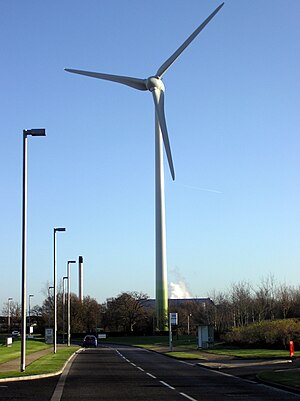 Image via WikipediaWhat is a Wind Turbine?
Image via WikipediaWhat is a Wind Turbine?A wind turbine is essentially a wind mill much like you’d see on farms or in Holland. However, instead of being attached to a mill to grind grain into flour, the turbine is attached to a generator. The result is energy. How much energy? Well that depends on the size of the blades and the wind speed.
Wind turbines can be used on a large scale to produce energy for a city. The turbines generally have two or three blades or rotors. On sunny, windy days they can produce several megawatts. The energy can also be stored for non windy days. On a smaller scale, for home use, a wind turbine can produce about 100 kilowatts. They work well to compliment a solar electric power system.
How a Wind Turbine Works
The sun is what heats the earth. This heating and cooling creates wind. In a way, wind energy is also solar energy. When wind is created it has force. It has energy. If you’ve ever stood outside on a very windy day you know that this energy can be quite powerful.
A wind turbine captures this energy and turns it into electricity. The wind turns the blades or rotors. The rotors are attached to a rod. When the rotors turn the rod turns as well. The rod is then attached to a gear. In an old fashioned wind mill that gear connects to a heavy gear at the bottom of the mill. It turns as the teeth of the gear rotate and it grinds the grain. In a wind turbine the gear is attached to a smaller gear and a generator. As this gear spins it creates electricity.
The generator creates electricity by using a magnetic rotor inside the generator. As the rotor spins around the core it electromagnetic induction and generates an electrical current.
 Image via WikipediaAn Environmentally Sound Energy Source
Image via WikipediaAn Environmentally Sound Energy SourceAs you can see, there’s really no byproduct of wind energy. The energy is either used or stored. There is no byproduct of the energy. The only downside to wind energy is that if the wind doesn’t blow at least 10 MPH then little to no energy is created. Additionally, the generator can be quite expensive.
If you’re looking to include wind energy for your home you may want to investigate the costs and lifespan of a typical generator. Over the life of a good generator you’ll definitely make your money back. And you can rest well knowing you’re using one of the cleanest and most environmentally friendly energy sources available.

No comments:
Post a Comment